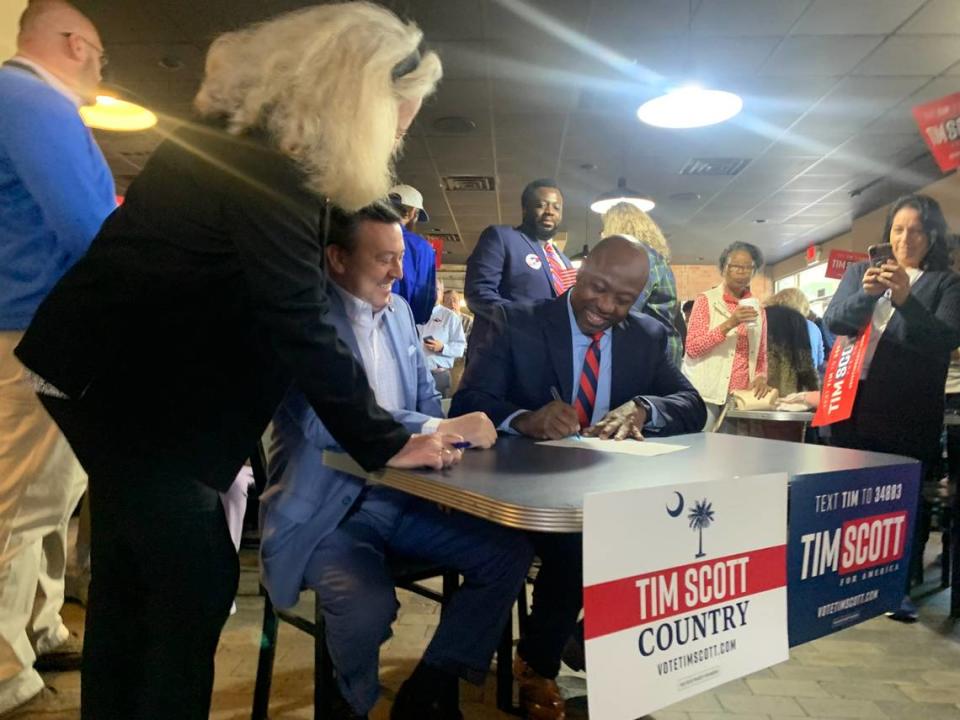Scott, Haley both trail Trump in their home state, but one may need SC primary win to survive
With former President Donald Trump holding healthy leads in national and early-voting state polls, the South Carolina Republican primary could end up being a must-win contest for the Palmetto State’s two homegrown White House hopefuls.
Both former Gov. Nikki Haley and U.S. Sen. Tim Scott trail the former president by far in the race for the GOP nomination. Haley’s polling has improved in recent months after her widely lauded performances in the first two GOP presidential debates, though she’s still only registering a little less than 8% of Republican voter support compared to Trump’s 58%, according to a RealClearPolitics average of national polls.
Scott, however, has remained polling in the single digits nationally and in Iowa and New Hampshire, which kick off GOP nominating process.
That means South Carolina could be a more dire contest for the U.S. Senate’s only Black Republican.
And the Scott campaign is trying to keep donors from reconsidering their financial support, while a super PAC backing the senator pulls ads from television screens.
Mikee Johnson, Scott’s campaign finance co-chairman, told donors on a September call that they should stay on the senator’s team at least until the South Carolina primary, according to Politico.
“It shouldn’t be lost on us that we’re still going to win the votes in South Carolina,” Johnson said in a call with donors, according to POLITICO. “And this is where we make the difference, right? We make the difference when we win South Carolina.”
Ultimately, performances in early states — whether they be victories or finishes in the top three or four in a splintered field — can show donors that candidates are viable and keep contributions coming in to keep campaigns operating.
In the recent past, South Carolina proved to be a campaign-saving firewall for another presidential candidate on the verge of faltering: Joe Biden.
In 2020, Biden lost the nominating contests in Iowa, New Hampshire and Nevada before a victory in the South Carolina Democratic Primary catapulted him to the nomination and eventually the presidency.
Scott’s team is hoping his home state can do the same for Scott as it did for Biden — that is, if he can win here.
Winning the South Carolina primary is key on the Republican side. Every winner of the South Carolina Republican contest since 1980 has gone on to win the nomination with the exception of 2012 when Mitt Romney won the nomination but Newt Gingrich won the Palmetto State’s primary.
Is South Carolina do-or-die for Scott?
Scott wouldn’t say if his home state, which will hold the First in the South GOP presidential primary Feb. 24, is a must-win for his campaign.
“I think we’ll get back on the campaign trail and continue to work in Iowa, New Hampshire and South Carolina,” Scott said earlier this month while speaking to reporters in Greenville. “I don’t know that there’s a do-or-die anywhere, but every single day, you should be on the campaign trail trying to tell people why you should be the next president.”
Scott’s lagging poll numbers led to a super PAC supporting Scott’s campaign to cancel TV ad buys for the fall and instead spend money to focus on its door-knocking program, a more-time consuming method of voter outreach that also can be the most effective way of convincing people to support a candidate.
“I think Tim Scott will have to pick up some momentum in the early states, or he won’t survive past South Carolina,” said Scott Huffmon, the director of the Winthrop University poll. “If he doesn’t have a good showing in Iowa and New Hampshire and loses South Carolina, it will be tough to argue you can keep going.”

When Scott signed his paperwork Monday to file to appear on the South Carolina Republican primary presidential ballot, he sat at a table that had a sign that said “Tim Scott Country,” below a Palmetto tree and blue crescent, to resemble the state flag.
Scott garnered 6% of support in the latest Winthrop University Poll of likely South Carolina Republican voters.
“The harder we work, the luckier we get,” Scott said when asked about his polling numbers. “I am so excited to be home in South Carolina. We continue to have a positive message. Hope and opportunity goes a long way. We need who will restore hope, create opportunities and unite our country. I think I’m that candidate.”
The idea of the Palmetto State as a firewall for Scott also could apply to Haley, who was twice elected governor of the state, including winning reelection in 2014 with 55% of the vote. Haley also finished first in a four-person primary for the GOP nomination for governor in 2010, garnering nearly 49% of the vote.
Haley has been climbing in presidential primary polls, securing a clear second place in South Carolina ahead of Florida Gov. Ron DeSantis and placing second in several recent polls out of New Hampshire.
The latest Winthrop University poll has Haley solidly in second place, with 18% of the support of South Carolina Republicans and Republican-leaning independents.
“No one will outwork Nikki Haley, and she’s proving it by working hard in Iowa, New Hampshire, and South Carolina,” said Haley campaign spokesman Ken Farnaso. “She takes nothing for granted, and we are confident we’ll do well in all three (states).”
However, Trump continues to lead in the early states, including holding an 29-point lead over Haley in South Carolina in the latest Winthrop University poll.
But Huffmon said a loss in South Carolina for Haley, although not helpful, may not spell the end of her campaign.
“I don’t think it’s an absolute nail in the coffin, but it certainly will be detrimental to her ability to continue to fundraise,” Huffmon said.

Campaign cash is the key
Coming into the race from a state that holds an early primary, Scott would seem to have a natural advantage.
Scott’s campaign entered the race for the White House with $22 million campaign cash already on hand, money carried over from his 2022 Senate reelection campaign. It is enough money to carry the campaign through the South Carolina primary.
His campaign has used that money to run ads in early-voting states to help introduce South Carolina’s junior senator to the nation. That strategy also means they have been burning through cash.
On top of his starting $22 million, Scott has raised $12 million during his campaign, which he launched in May, and finished September with $13.3 million cash on hand.
Through the end of September of this year, Haley has raised $26 million and has $11.6 million cash on hand.
South Carolina political consultant Rob Godfrey, who previously worked in Haley’s administration, said Haley and Scott’s campaign cash position gives them a lot of space to campaign in Iowa, New Hampshire and South Carolina.
“I don’t think there’s any state that’s do-or-die for the candidates like Gov. Haley or Sen. Scott who have had the good fortune of raising as much money as they have over the course of this campaign,” Godfrey said. “The two of these candidates have always been known for their prodigious fundraising abilities and have the resources they need to compete all the way to Super Tuesday from what I can tell, and I wouldn’t expect either one of them to be thinking about any sort of exit strategy before that time.”
What happens in earlier states of Iowa and New Hampshire also will shape what happens in South Carolina and subsequent states.
The field will most likely narrow to two to four viable candidates after Iowa and potentially down to three after New Hampshire.
“The natural winnowing process will allow us to see the best candidates rise to the top, and that will make each state in which they compete more and more important,” Godfrey said.
Whether South Carolina becomes a do-or-die state also depends on how well the candidates do in earlier states and how close the vote totals are in the First in the South primary, Godfrey said.
“That all depends the most on how close the margin is to the frontrunner (who) we have no reason to believe won’t be a significant frontrunner at that point,” Godfrey said.
Ultimately, the question is whether candidates will have the financial resources to continue their campaigns.
Losses in the early primaries may affect donors’ commitments to candidates to support a campaign.
“Success at the ballot box breeds success in fundraising,” Huffmon said.


